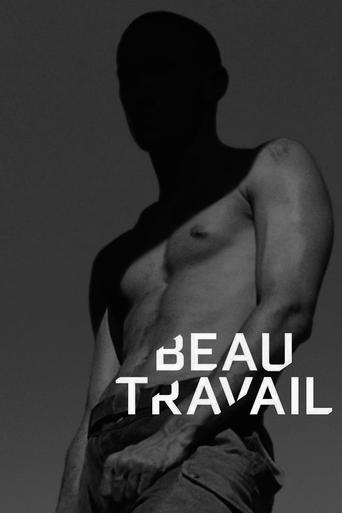

What a waste of my time!!!
... View MoreLet's be realistic.
... View MoreIt's funny watching the elements come together in this complicated scam. On one hand, the set-up isn't quite as complex as it seems, but there's an easy sense of fun in every exchange.
... View MoreIt's a feast for the eyes. But what really makes this dramedy work is the acting.
... View More"Gold in the mountain, and gold in the glen, and greed in the heart, heaven having no part, and unsatisfied men." - Melville Claire Denis directs "Beau Travail". The film's loosely based on several Herman Melville poems ("The Night March" and "Gold in the Mountain"), as well as Melville's "Billy Budd", a maritime tale which questioned man's thoughtless submission to various forms of authority (military, media, biblical, political etc). Denis' film swaps the novella's maritime setting for the sandy deserts of Djibouti, a country in Eastern Africa. Her protagonists are soldiers in the French Foreign Legion. They're stationed in Djibouti to do the neo-Imperialist biddings of France and (unofficially) the US, who to this day maintain violent, dictatorial puppet regimes in the country. The site of the only "official" US military bases on the African continent, the country is also used as a staging ground in an overall strategy to dominate the Horn of Africa, the Gulf of Aden and the Arabian Peninsula. From Djibouti, various plots were, and continue to be, mounted to destabilise Ethiopia and Somalia."Different viewpoints count," Sergeant Galoup (Denis Lavant) narrates at the start of the film. He's speaking in hindsight. The film then jumps from Galoup's apartment in France to the deserts of Djibouti, several months prior. Here Galoup feuds with Gilles, a fellow soldier whose physical beauty, social standing and strength inexplicably make him jealous. Later Galoup orders Gilles to trek across the African desert without water and with a tampered compass. The man almost dies, leading to Galup's swift court-martial. Significantly, Gilles is rescued by a group of Djiboutis. Other scenes focus on the persecution of black officers within the Foreign Legion. The film ends with close-ups of Galoup's veins, quietly pumping blood, before a beautiful sequence in which he dances to Corona's "The Rhythm of the Night". More than Melville, key influences on the picture are Jean-Luc Godard's "Le Petit Soldat" and Resnais' "Muriel". Both dealt with the Algerian war, a then-taboo subject which led to both films being attacked and banned. Denis' film maintains the structure and voice-over narration of Godard's film, linkages which are made explicit by the military superior in her film being named after the hero of Godard's. They're also played by the same actor (Michel Subor). Interestingly, the voice over narration in both films are designed to echo each other. "I have a lot of time ahead of me," the narrators of Denis' film begins, precisely the line which ends Godard's picture. The message is clear. History rolls on, and France's imperialist doings didn't end with Algeria. Denis spent much of her childhood in Djibouti. She wrote "Beau Travail's" script herself and teamed up with female cinematographer Agnes Godard for the shoot. The duo create a film which plays like a series of dreams within dreams, mirages within mirages, memory fragments constantly dancing and fusing and fluttering off into the wind. The film unfolds like dance, ethereal, hazy and liquid. Most of its running time consists of shots of soldiers training, working, exercising and waiting. These sequences are simultaneously banal and highly choreographed, the men's bodies bending to some unspoken dance routine. Throughout the film Denis captures the dangers of machismo, male egos and a kind of simmering hunger for violence. But her imagery is both homo-erotic and neutering; these warriors are feminized, painted as infants, small boys, sensitive, confused, pitifully childish and overly emotional. Denis softens everything, turns masculinity into something weak and soft and round, which indeed was always the unspoken core of even "traditional masculinity". Still, these soldiers are dangerous. And they are dangerous precisely because of their weaknesses. Most of the film functions as a dreamy allegory for the white man's desire to violently assert himself over the Other, be they African or fellowman; to deny the Other's culture, voice, customs, practises or right-of-governance. Galoup in particular is obsessed with control, organisation and the meticulous. Some have said the film is about Galoup's "homosexuality", but this misses the point. Whilst all sexuality is on some level violent, the film itself is almost completely asexual. The soldiers have been conditioned to repress love, not sex, and it is this conditioning which flies in the face of the men's homo-social love, which in turn results in violent blow-back. The film's title means "beautiful work", referring ironically to the Empire's work in Africa, and of course its long-standing rationalisations for bloodshed. The film's title is also a command, a call to do "good work" rather than the devil's deeds. Much of the film is sprinkled with shots of African women, who exist outside the soldiers' story. Like a Greek chorus, they're positioned to both witnesses white cruelty, silently judging from afar, and to mock the petty men skirmishing below them. The gyrations of these African women to pop songs is later mirrored to Galoup's own dance sequence (no rehearsals, shot in one take), in which his ego softens, he symbolically turns his back to a reflection of himself and he finally cuts loose. This is the only moment in the film in which Galoup shifts from a watcher and subject - and by extension a master - to an object. He relinquishes control and allows us to possess a piece of him. Denis' work frequently deals with the Empire's relationship with Africa ("White Material", "No Fear, No Die", "Chocolat", "35 Shots of Rum" etc). Of these, "Beau Travail" is perhaps her most unconventional film. See too "35 Shots of Rum", arguably a better film, which uses Jean Renoir as a springboard as Denis uses Godard here. 8.5/10 – Worth two viewings.
... View MoreI was very happy with this movie. The languid pace of the editing serves the remembrances of a jealous and obsessive commanding officer, as he recounts his dealings with a young legionnaire. Claire Denis skillfully allows static shots to evolve into moving shots and still figures to resemble the dynamism of Grecian statues. Many times, while watching the legionnaires perform their arduous training drills, I was reminded of classical statues. I also noticed how there was a vague homo-erotic underpinning to the legionnaire lifestyle, never outwardly expressed. Galoup, the officer who remembers the story for the viewer, only has access to certain aspects of the events portrayed. This leaves the viewer to do much of the work in figuring out what has happened. In the end, the narrative splits and we have a vision of Sentain, the young legionnaire, suffering in exile. I found this split necessary and welcome though, as it perhaps constitutes a dream or fantasy being experienced by Galoup. Galoup's obsession with Sentain allows him to construct his own version of what happens to the younger man when he left the legion. I was also sometimes reminded of '300', though only inasmuch as they are both movies that show a certain respect and love for the male form. However, in '300' the male form becomes a device of basic warfare or basic sexual desire. In 'Beau Travail,' the male form is much more utilitarian, perhaps even universal. Effort went in to showing the monotony and conformity of the chores and drills; the things that cause all of the men to look, act and think the same, and the overall effect that militarization might have on the psyche of the individual. I highly recommend this movie to anyone who hasn't seen it.
... View MoreIntrospective and subtle, Claire Denis' BEAU TRAVAIL offers a modern retelling of Herman Melville's BILLY BUDD, transposing the tale of an officer who self-destructs through his jealousy of a new recruit to an outpost of the French Foreign Legion. And although the film is elegant in both its simplicity and purity, I myself found it a shade too simple and pure to be completely effective.Still, BEAU TRAVAIL has two things going for it: director Denis' cinematic eye and superior performances throughout. One truly senses the location in all its elemental nature, and the cinematography is remarkable for its restrained elegance. The cast follows suit, with direct and underplayed performances that fold seamlessly into both Denis' atmosphere and the story itself, and the result is often quite stylish.But for all its elegance and style, I found BEAU TRAVAIL too introspective and subtle for its own good; to me it lacks any significant substance, with both story and characters slipping through my attention as easily as sand slips through my hand. While this is doubtlessly part of director Denis' intent, and while I have admired many a film with a notably elusive touch, my ultimate reaction to BEAU TRAVAIL is that it is a rather superficial exercise in style over substance, and I cannot say that it leads me to interest in the director's other work.In passing, I also note that BEAU TRAVAIL is often marketed as a film with homoerotic context and imagery, but I personally did not find it so. Final word: worth a look, but not greatly memorable for all that.Gary F. Taylor, aka GFT, Amazon Reviewer
... View More... but I guess I'd like it like other very personal Claire Denis movies. Mauvais Sang from Leos Carax and with Denis Lavant is also a personal favorite and I've seen it quoted somewhere. Just because a movie is stylish doesn't mean it's bad. Unstylish movies? Lots of them... Claire Denis succeeds in creating a very personal climax that makes for movies to be remembered long after you've seen them. Beau Travail would translate literally as "Beautiful Work" but I think the best translation would be "Nice Job" as in "You did a nice job, here". With the ambiguity of job meaning both work and occupation. I don't think "Good Work" is a proper translation like I've seen here and there.
... View More